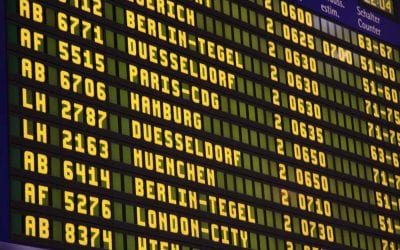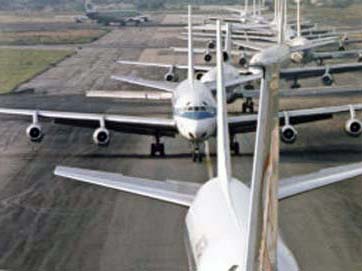If you’re flying on a European airline in 2024, you have more rights than you may think.
 If you’re flying on a European airline in 2024, you have more rights than you may think. The reason? EC 261 (also referred to as the EU 261), the European consumer regulation, gives broad protection for passengers — far broader than anything offered by U.S. airlines.
If you’re flying on a European airline in 2024, you have more rights than you may think. The reason? EC 261 (also referred to as the EU 261), the European consumer regulation, gives broad protection for passengers — far broader than anything offered by U.S. airlines.
But it’s not a perfect regulation and it doesn’t apply to every flight. What’s more, the COVID-19 pandemic has tested the rule, and the effects of the coronavirus on EC 261 could last a generation. Bottom line: You need to study EC 261 carefully before invoking it. But it’s worth knowing.
What is EC 261?
Formally known as Regulation (EC) No 261/2004, EC 261 is a regulation adopted by the European Parliament on Feb. 11, 2004. It establishes common rules on compensation and assistance to passengers in the event of denied boarding or cancellation or long flight delays. The definition of “long delay” depends on the distance. Here’s my guide on denied boarding compensation.
For the full text of EC 261, see the European Parliament website.
What are the main provisions of EC 261?
This regulation provides for assistance and monetary compensation to airline passengers in situations of overbooking, cancellation or delay of a flight. The type of assistance and amount of monetary compensation depend on the circumstances (e.g., cancellation or length of delay) and the distance between the flight’s origin and destination.
Remember, this is just a summary. See the full EC 261 text for all official definitions, provisions and restrictions.
I’m flying from the U.S. to Europe. Does EC 261 apply?
In the case of flights terminating in an EU country, the regulation applies only to flights operated by an EU carrier. Thus, if you’re flying from Chicago to Frankfurt, the regulation applies only if you’re flying on Lufthansa (or another EU carrier). If you’re flying in the opposite direction, it applies even if you’re on United Airlines, because the flight originated in an EU member country.
I’m flying from the United States nonstop to a non-EU country. Is EC 261 applicable to my trip?
No, because the flight neither originates nor terminates in an EU member country.
I’m flying from a EU country to a non-EU country on a European carrier. Is EC 261 applicable to my trip?
Yes. The flight originates in an EU member country. (Even if you were flying on a non-European carrier, it would still apply, because the flight originates in an EU member country.)
Does EC 261 apply after Brexit?
Despite Brexit, Britain remains part of the European regulatory framework, so EC 261 continues to apply. UK legislators wrote it into law in 2020 and it remains in effect now.
My flight is a code-share. Do the rules still apply?
The regulation does not explicitly address code-shares. However, the preamble states that the obligations created by the regulation “should rest with the operating air carrier who performs or intends to perform a flight, whether with owned aircraft, under dry or wet lease, or on any other basis.” (The regulation defines an “operating carrier” as “… an air carrier that performs or intends to perform a flight under a contract with a passenger or on behalf of another person, legal or natural, having a contract with that passenger.”)
In theory, this should mean that the regulation is applicable based on the carrier that actually operates the flight, rather than the carrier that sold the ticket. For a hypothetical flight between the United States and Europe, applicability would depend on the operator of the flight and the direction of travel:
From Europe to the United States:
- Ticket sold by Lufthansa, flight operated by United Airlines: EC 261 applies because the flight originates in an EU country.
- Ticket sold by United Airlines, flight operated by Lufthansa: EC 261 applies because the flight originates in an EU country and is operated by an EU carrier.
From the United States to Europe:
- Ticket sold by Lufthansa, flight operated by United Airlines: EC 261 does not apply because the flight originates outside the EU and is not operated by an EU carrier.
- Ticket sold by United Airlines, flight operated by Lufthansa: EC 261 applies because the flight is operated by an EU carrier.
However, all of the examples I cite above are subject to caveats. First, the regulation does not specifically address code-share situations, and second, a code-sharing flight often presents the airlines involved with an opportunity to engage in circular finger-pointing, leaving the traveler stuck in the middle.
My airline delayed my U.S. domestic flight, and I missed my connection to Europe. Does EC 261 cover me?
EC 261 would not apply in this case, for two reasons. First, the delayed flight was entirely within the U.S. Second, even though EC 261 might have covered the connecting flight from the U.S. to Europe, the airline did not cancel or delay the flight.
EC 261 contains an exclusion for “extraordinary circumstances.” What constitutes an extraordinary circumstance?
EC 261 states that airlines’ obligations to passengers as set forth in the regulation are limited or excluded in “extraordinary circumstances,” which are defined as follows in the preamble:
(14) As under the Montreal Convention, obligations on operating air carriers should be limited or excluded in cases where an event has been caused by extraordinary circumstances which could not have been avoided even if all reasonable measures had been taken. Such circumstances may, in particular, occur in cases of political instability, meteorological conditions incompatible with the operation of the flight concerned, security risks, unexpected flight safety shortcomings and strikes that affect the operation of an operating air carrier.
(15) Extraordinary circumstances should be deemed to exist where the impact of an air traffic management decision in relation to a particular aircraft on a particular day gives rise to a long delay, an overnight delay, or the cancellation of one or more flights by that aircraft, even though all reasonable measures had been taken by the air carrier concerned to avoid the delays or cancellations.
After a flight delay, overbooking, or cancellation, how long do I have to apply for compensation?
EC 261 is silent on deadlines for seeking reimbursement or compensation. However, it is always in the passenger’s interest to file a claim as soon as possible. It might be advisable to ask for monetary compensation on the spot. At a minimum, request the information described in Article 14.
How do I file a complaint under EC 261?
Most, if not all, EU airlines have information on EC 261 on their websites.
The EU maintains a list of national enforcement bodies; however, it is generally better to address complaints first to the airline that operated the flight or flights in question.
What form must compensation take?
Article 7 states that the airline must pay compensation in cash, by electronic bank transfer, by bank order, or by bank check. The airline can compensate passengers with “travel vouchers and/or other services,” but only with the passenger’s signed authorization.
How much time does the airline have to reimburse me?
Article 8 states that you must make a request for reimbursement within seven days.
What are the airline’s obligations to make passengers aware of their rights?
Article 14 states that the airline must provide a “clearly legible” notice. It must state that passengers may be eligible for compensation in the event of denied boarding, delay or cancellation. When that happens, the airline must provide each affected passenger with a written description of their rights.
What do I need to know about services that offer EC 261 compensation? Do you recommend any?
Two of the companies that offer assistance in filing EC 261 claims are AirAdvisor, AirHelp and EUClaim. AirHelp sells an annual membership. It helps secure compensation for flight delays, cancellations and overbookings that occur within a specific geographical area. It also advertises assistance specifically related to EC 261 claims.
EUClaim is a website based in the United Kingdom that offers similar services related to EC 261 claims. The company does, however, take a commission from any compensation it may recover.
We do not endorse or recommend any third-party sites that offer assistance with these or other similar types of claims.
In implementing EC 261, the EU afforded airline passengers a defined level of protection. But it isn’t always clear whether the regulation applies to a given flight. And of course, airlines are by nature averse to paying compensation. So even with the protections of EC 261, you may encounter resistance when requesting that compensation. If that happens, remember that the team at Elliott Advocacy is here to help.
READ ALSO:
How to get about $600 in flight delay compensation with EU rules
On record-keeping, why do airlines play dumb with Congress?

Christopher Elliott is an author, consumer advocate, and journalist. He founded Elliott Advocacy, a nonprofit organization that helps solve consumer problems. He publishes Elliott Confidential, a travel newsletter, and the Elliott Report, a news site about customer service. If you need help with a consumer problem, you can reach him here or email him at [email protected].



